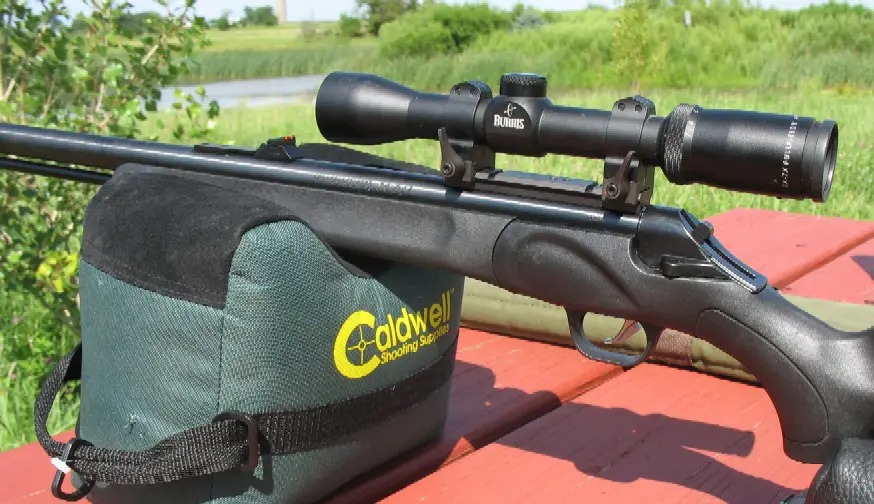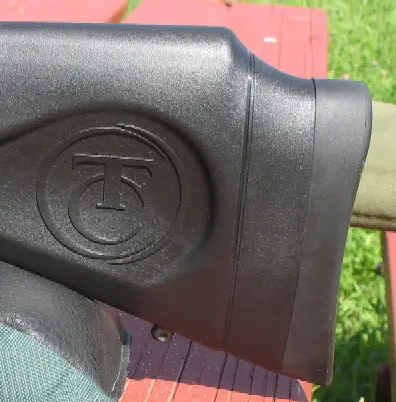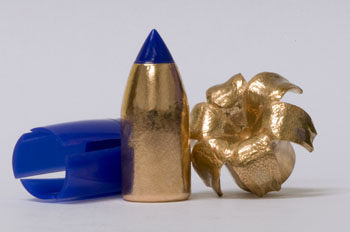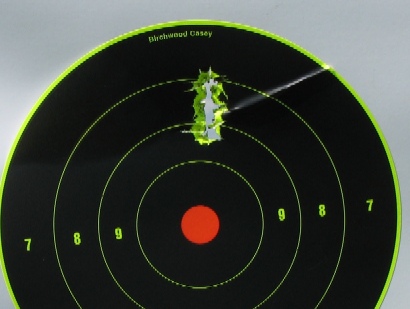


Thompson's New .50 caliber Muzzleloader: the Impact!

New for 2010, and introduced at the SHOT Show in January, the Thompson Impact inline muzzleloader has finally arrived. Reviewed here is the basic blued, black synthetic model that is currently selling for around $250 street price, an astonishingly appealing level for a new Thompson frontstuffer. There are several remarkable things about this rifle aside from its low initial purchase cost. It is a new action from Thompson, it has an adjustable stock length, and it has a good trigger.
The gun itself, including ramrod and installed one piece scope base weighs about 7-1/4 lbs. The bluing is well-done and evenly applied, showing a higher level of polish than the crude matte finishes you see in this price range. The stock has a removable one inch spacer at the butt, so you can use it as supplied (13-1/2 inch) or easily shorten it to 12-1/2 inches. For your son or daughter, you might find the shorter length ideal. If they grow into a longer stock requirement, you're already there without having to buy a replacement stock. In either case, you can still use the factory recoil pad which is of a softer durometer than some of the older T/C vented pads. The Impact has a surprisingly good trigger, very crisp and breaking at 3-3/4 pounds. Billed as a 26 inch barrel, the barrel is actually about 25 inches from muzzle to breechplug, the only part of the barrel you can use, and you can also remove about three quarters of an inch of T/C “QLA” false muzzle that is both oversized and has no rifling.

A one-inch removable section is built-in to the T/C Impact's buttstock, allowing effortless shortening of the stock from 13-1/2 inches to 12-1/2 inches if desired, still using the same, effective, soft-durometer factory T/C recoil pad.
Over the years, I've reviewed many, many examples of Thompson muzzleloaders, and they have received generally favorable if not glowing reviews. The T/C Omega really shook up the muzzleloading world in 2002 and recently over the last several years the influence of both the Omega and the Encore 209 x 50 has been obvious. Many of the models released since then have been crude, poor attempts at copying Thompson product. The entire break-action craze and widespread popularity of the break action hammer muzzleloading rifle can be traced to the Encore, with a whole slew of fabulously bad muzzleloading attempts regularly appearing and disappearing ever since trying to capitalize on the look and feel of the Encore.
So, that's where we have been in large measure, with the extruded barrel CVA Kodiak a very poor, sometimes dangerous to operate, crude copyist attempt at imitation of the T/C Omega. In flailing attempts to try to ride the coattails of the T/C Encore, we have had the dismal CVA Optima, CVA Accura, Traditions Pursuit, and Traditions Vortek that sadly just imitate. As soon as T/C introduced their “Speed Breech” breechplug, the copyists were soon to follow yet again. It has to be a bit frustrating for Thompson, as they've spent a lot of time and money developing their huge muzzleloading accessory line.
Predictably, a new T/C accessory is often cloned, made in China, and sold by the unscrupulous copyists. It sure doesn't do much for the Thompson employees in Rochester, New Hampshire, that proudly make Thompson barrels from American steel on their own barrel line, but life isn't always fair. Anyway, the Spanish “Bic Lighter Quality” muzzleloaders, shoved into a box overseas with no known testing or quality control is something the savvy consumer runs away from.
Despite almost universally good experiences over the years with T/C muzzleloaders, when a new model comes out that doesn't cut the mustard, candidness forces me to report those impressions. Such was the case with the previous T/C new muzzleloader, the “Triumph” also rebranded as the “Bone Collector.” The Triumph / Bone Collector was a mixed bag, perhaps the world's clumsiest muzzleloader to use with its inexplicable toggle-lock action. Aside from the Triumph lapse, T/C has done a laudable job.
That bring us to the 2010 Impact. Far better balanced than the nose-heavy Triumph, it is also a lot handier to prime thanks to the new action style, their “hood design.” It is an ambidextrous action, having twin ears at the back of the receiver that opens the gun up quickly, making priming a fast and effortless task. It doesn't have the interrupted thread “Speed Breech,” instead going with a more conventional breechplug that uses triple lead threads making it a bit faster to remove. The notion of a quick release breechplug doesn't make any sense in the first place. I can't imagine a race in a tree stand to see who can remove their breech plugs first, but maybe there's some breech plug removing contest I've never heard of?
There are a few considerations that go along with the aggressive price point, such as a plastic trigger guard and a very simple, alloy frame. Even the spartan supplied accessories display this, such as the aluminum jag rather than the traditional brass. The Impact still retains a sturdy ramrod, though, along with reasonably good Williams fiber optic sights.
The Impact's 1:28 rate of twist barrel is made from carbon steel. Quality American steel, as used in rifle barrels, typically goes through ultrasound, dye penetrant, and eddy current testing before the solid bar ever leaves the mill. Thompson has long advertised their continuous magnafluxing of muzzleloading barrels, including their sidelock barrels, to guard against imperfections. These are the standard types of metallurgical quality control we should expect to be present in every muzzleloading rifle and every firearm. Sadly, with only a couple exceptions such as Pedersoli, imported blackpowder arms are of dubious quality, with very poor track records of safety. They elect not to publish that they comport to C.I.P. Standards, standards which have the force of law in their respective countries, because they cannot. There is only one reason to skip the convention of C.I.P. mandated testing, only one. It saves money, translating to more profit dollars at the expense of consumer safety. That's all there is and it is sad.
I mounted a Burris 2-7 x 35mm Fullfield II ballistic-plex reticle scope on to the Impact with Warne Steel Maxima Quick-Release rings and it was off to the range. This Burris scope is a nice for for the Impact, not overwhelming the gun at all and offering generous clearance for hammer access with gloved hands. I've had the best results as of late with Federal 209A or CCI 209M primers, I went with the Federals for the Impact testing along with Western Powders' Blackhorn 209 blackpowder substitute propellant.

Barnes Spitfire T-EZ Flat Base Expanders seem almost tailor made for T/C inlines. The 250 grain T-EZ Flat Base Barnes loaded easily, but shot tightly in the T/C Impact despite a hot day and a hotter barrel.
If there is a saboted bullet practically tailor made for the generally tighter-bored Thompsons, it is likely the Barnes Expander Spitfire T-EZ 250 grain Flat Base saboted bullets. That's generally my first choice with T/C product and in this case, it proved to be a good one. The Barnes 250 grain Flat Base saboted bullets loaded extremely easy, so easy as a matter of fact my impression was that I might have to go with a thicker sabot. No, need, they shot superbly well with 90 grains of Blackhorn 209 measured by T/C U-View volumetric black powder powder measure, good for about 1850 fps out of the muzzle. Despite being a very, very soft-shooting combination out of the Impact, this is a 175 yard six inch kill zone maximum point blank range load with no doubt. In rough terms, sight this in three inches high at 75 yards and out to 175 yards it is center of the body hold and go pick him up. Naturally, you'll want to confirm your own rifle at 175 yards under your own ambient conditions before a hunt.

At 100 yards on a very warm, humid day the Impact was still able to shoot Barnes 250 grain T-EZ Flat Base sabots into one ratty hole, powered by 90 grains by volume of Western Powders' Blackhorn 209.
I did get some vertical stringing, but that was my own fault. It was a humid day, pushing ninety degrees, and with Blackhorn 209 it is load and shoot, load and shoot. As a result, I did get the Impact's barrel extremely hot, and each successive shot dropped the point of impact of the Impact incrementally downward. I should have waited for the barrel to cool between shots, of course, but I was having too much fun to slow down. Regardless, nothing could live on the difference, certainly no deer at 100 yards, or coyote for that matter possibly could. After all the shooting was over with, clean-up was about a two minute affair. Two patches of Hoppe's #9, followed by one patch of Montana X-treme Gun Oil, that's it. Though Blackhorn 209 is essentially non-corrosive, no propellant or primer is truly, completely non-corrosive. A quick two minute procedure like this at the end of the shooting day is all you need to keep your new muzzleloader in great shape for many, many years.
This is a home run for Thompson-Center Arms. It is the best new muzzleloader introduced in several years and the best dedicated muzzleloader T/C has released since the Omega. It is well-balanced, great handling, has an exceptional trigger, and is ridiculous easy to use. This example has more accuracy than you can use on most hunts, with a little help from both Barnes bullets and Blackhorn 209. In 2010, a $250 dollar street price for a 100% Made in the USA lifetime warranty T/C inline is a screaming deal. Most folks won't have much choice except to buy one for their wives and kids, or at least that's what you might want to tell them.
It
shoots and functions way, way beyond its diminutive price tag. It may
well be the best $250 muzzleloader ever made. So, all I can say at this
juncture is congratulations to T/C for a job well-done. It is a thoroughly
enjoyable, immensely affordable muzzleloader that the whole family will
benefit from, at the range or in the field.
Copyright 2010 by Randy Wakeman. All Rights Reserved.

Custom Search


